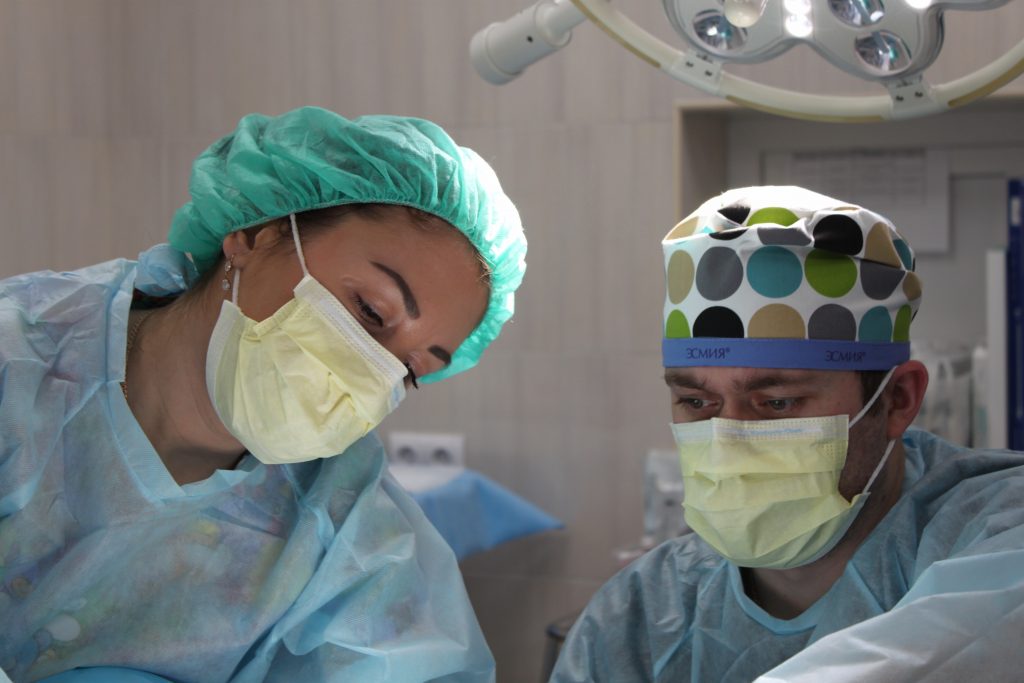In the following article, we will cover various aspects of an orthopedic surgeon job, including educational requirements, skills, responsibilities, and more.
An orthopedic surgeon is a trained and educated physician who diagnoses and treats injuries, diseases, and disorders of the musculoskeletal system.
They perform operations on bones, nerves, joints, tendons, and ligaments.
These doctors treat various conditions such as arthritis, fractures and dislocations, and damage to muscles, tendons, and ligaments.
Some surgeons focus solely on general orthopedic surgery, others, on a specialty treatment, such as joint replacement, sports medicine, or a specific part of the body.
Article Table of Contents
What Does an Orthopedic Surgeon Do
Orthopedic surgeons work to diagnose and provide the right treatment to people of different ages and backgrounds.
The treatment may include medication, physical therapy, and, of course, surgery.
Usually, they work in clinics or specialty hospitals.
These professionals are highly qualified doctors with over 10 years of educational background and specialized training.
This profession is one of the highest-paid medical specialties.
Responsibilities
- Interview patients for their symptoms and concerns, and collect information about their medical history and conditions, such as allergies.
- Educate patients about procedures and treatments.
- Diagnose patients, and perform noninvasive and surgical procedures.
- Prescribe supplements and medications.
- Coordinate medical staff and schedule facilities for operations.
- Keep accurate and updated records of treatments and patient services.
- Develop care plans for the post-operative period, and recommend lifestyle changes, such as exercise or diets to benefit the healing process.
- Examine surgical instruments and equipment to ensure they are sterile and ready for the procedure.
- Guide and supervise the education of medical residents and students.
- Refer patients to other doctors such as physical therapists.
- Participate in continuing education and conduct research.
- Provide treatment updates to families and educate them about the recovery process.
Essential Skills
Communication skills:
Orthopedic surgeons should be able to explain diagnoses and treatments in simple terms that patients can understand.
They should also manage and lead multidisciplinary teams of healthcare staff.
Problem-solving:
Orthopedic surgeons face complex issues every day and have to come up with decisions quickly and confidently.
Good manual dexterity:
It is essential that orthopedic surgeons have good manual dexterity.
They should also have good hand-eye coordination, great vision, and visuospatial awareness.
Physical stamina:
To be able to cope with the demands of surgery, orthopedic surgeons need excellent physical stamina.
How to Become an Orthopedic Surgeon
The field of orthopedic surgery is highly competitive and requires over a decade of education and training.
First, you should complete a four-year undergraduate education, then four years of medical school.
After that, five years of residency are essential.
Finally, you need to have two years of practice in orthopedic surgery and pass written and verbal examinations to become a certified orthopedic specialist.
Training and Qualifications
In the US, there are 170 accredited orthopedic programs with about 650 residency positions available every year.
You should be licensed to practice general medicine to be considered for an orthopedic residency program.
You should have strong academic performance, be apt in manual dexterity, mechanical ability, and have exceptional three-dimensional visualizations skills.
The residency for orthopedic surgeons is a postgraduate clinical training program.
It takes five years during which you will complete rotations where you receive in-depth surgical and clinical training in all orthopedic specialties.
During the residency, your performance will be closely monitored to ensure that you obtain the necessary knowledge and develop technical skills.
You will be evaluated by a supervising faculty member after completing every rotation.
To obtain board certification, you have to complete written and oral exams administered by the American Board of Orthopedic Surgery.
This certification is not required by it can set a physician apart since they will possess knowledge and training to become an orthopedic specialist.
Experience
While you are still at med school, you can start planning for your residency.
You should attend orthopedic department conferences, volunteer to assist in orthopedic-related projects or look for a mentor in orthopedics at your school.
This type of experience can help you establish your reputation and set you apart from other applicants.
During your residency, you can continue looking for opportunities.
You can join a committee and attend national meetings.
Additionally, you can get involved in teaching giving presentations and lectures.
Ongoing learning and training are essential for an orthopedic surgeon to maintain certification and stay up-to-date with the developments in the field.
Working Hours
Besides the on-call time, orthopedic surgeons work 50 to 60 hours a week.
The schedule and on-call times can vary depending on the practice environment.
Private practitioners work longer hours so that they can establish their practice, but they have some control over the amount of work.
The hours of orthopedic group practitioners are usually shorter than private ones with less time on-call.
The longest hours are in universities because of the demands of academic productivity.
They may have to run clinical trials, supervise students, and conduct hands-on research.
Orthopedic surgeons usually have meetings early in the mornings and should handle administrative aspects of insurance, lawyers, and emerging healthcare policy.
All these functions are necessary to provide care.
Career Outlook
The job of an orthopedic surgeon includes helping people through fulfilling and interesting work.
The field is highly competitive and requires extensive training and education, but the employment rate for orthopedic surgeons is predicted to grow.
The reasons for the increase include the demand for services by the aging and growing population.
Financially, this is a rewarding career.
The salary can depend on the system and location you practice in.
The median salary of orthopedic surgeons is reported to be at $362,061 per year.
It can range from $121,200 to $552,778.
By developing the orthopedic procedures and devices as well as working with sports organizations, you can increase your income.
If you take additional training after obtaining your license, you can also increase your income.
With that, you can pay out your med school loan faster and increase the return on investment.
Conclusion
The field of orthopedic surgery is highly competitive and requires you to invest a decade in your education.
While the job can be challenging, it’s a rewarding career that allows you to help people in need.
There are multiple specializations you can follow that can lead to a variety of opportunities and financial stability.

